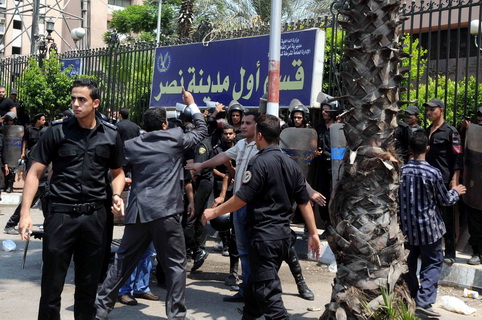WARSAW: “Poland – 10 years, Hungary – 10 months, East Germany – 10 weeks, Czechoslovakia – 10 days. So chirped many in Prague in November 1989, reflecting the pride and the joy of the Velvet Revolution, but also the sustained effort that was needed to end communism, whose demise began in Warsaw the previous February.
Indeed, communism’s breakdown began 10 years earlier in Poland, during Pope John Paul II’s first pilgrimage to his homeland, a visit that shook communist rule to its foundation. Within a year, Polish workers were striking for the right to establish independent trade unions, staging two weeks of sit-ins at state-owned factories to achieve their goal. Karl Marx would have been proud of them, but it was the Pope’s portrait that hung on the gate of Gdansk’s Lenin Shipyard during the strike.
The Solidarity union that was born in 1980 broke the Communist Party’s monopoly on power. The movement united 10 million people: workers and professors, peasants and students, priests and freethinkers among them – all of civil society. This infant democracy was harshly interrupted when martial law was imposed in December 1981, with Solidarity outlawed and dissidents arrested. But this totalitarian blitzkrieg could not last. Democracy did not die; it merely went underground.
For the next seven years, Solidarity fought for re-legalization, building the biggest underground network of resistance Europe had seen since Hitler’s war. But this was non-violent resistance. Its main weapon was the language of freedom. In the mid-1980s, there were about 1,000 independent, uncensored journals in Poland. They represented a full range of ideas and editorial styles – from factory leaflets and bulletins to intellectual magazines.
Hundreds of books prohibited by Communist censors (for example, Gunther Grass’s “The Tin Drum ) came to light.
Solidarity’s leader, Lech Walesa, did not surrender in prison and retained his national esteem. With the economy in steep decline, Poland’s rulers began to seek to stabilize the political system and reestablish relations with the West. In 1986, the government released political prisoners – a precondition for talks with the opposition. But it took the Communists two more years to realize that they could not introduce economic reform without Solidarity’s assent.
So talks began. The reason they were possible at all was that the opposition’s goal was not the violent overthrow of party rule. Instead, its democratic goals were to be fulfilled by a compromise with the authorities.
Walesa and his closest advisers – Bronislaw Geremek and Tadeusz Mazowiecki – pushed this moderate policy, demanding liberation while recognizing the political reality of Soviet domination.
Two waves of strikes in 1988 forced General Jaruzelski’s government to negotiate with Solidarity, which, after a few months of hedging, was legalized. The “Roundtable talks to change the political system could begin.
The haggling continued from February until April 1989. The main issues were legalization of the opposition, partially free elections, and creating the office of president to replace the Communist Party chief.
The Communists were guaranteed a majority in parliament. While the election to the newly created Senate was entirely free, the opposition could compete for only one-third of the seats in the Sejm (the lower house).
But the key point was that the party’s monopoly on power was jettisoned. Solidarity gained the opportunity to create independent media and a grassroots political organization. Finally, the Communists agreed that the elections to be held in four years would be entirely free. The road to democracy was open.
But the dictatorship’s end came sooner then anyone expected. In June 1989, the opposition won the parliamentary election in a landslide. It was impossible to form a government without its participation. Jaruzelski was elected president, but he had to accept the new division of power. The decisive political maneuver – building a coalition with allies of Communists – was carried out by Lech Walesa. A Solidarity representative, Tadeusz Mazowiecki, became prime minister.
In September 1989, Poland had the first government ever led by democratic parties in the Soviet bloc. It was a revolution, but with a difference: the political system changed without a body count. This was due, above all, to Solidarity’s prudent policy. But it was civic activity – resistance movements, strikes, and other manifestations of social support – that buttressed Solidarity. Mikhail Gorbachev was important; his non-intervention policy toward Eastern Europe meant that Soviet tanks would not annul the changes, as they had done with the Prague Spring.
The Polish Communists did not intend to build democracy; their plan was to absorb moderate opposition groups into a partially modified political system.
Handing over power to Solidarity was the last thing they had in mind. Yet the Roundtable compromise turned out to be good even for them, as communist “reformers began to build new careers in business and politics (one, Aleksander Kwasniewski, became Poland’s second democratically elected president).
The Roundtable also provided the Communists with a sense of safety that diminished their fear of democratic change. A hangman’s noose did not await them. This was an important sign for Poland’s neighbors in the Soviet bloc, which took its example to heart. In a few months, talks between Communist bosses and their democratic opponents (often in the form of a roundtable) paved the way to free elections and new democratic governments in Budapest, Prague, East Berlin, and Sofia.
By 1989’s end, the post-Yalta Europe was free. Since then, the symbol of the great revolution of 1989 has been the fall of the Berlin Wall. But the Roundtable talks in Warsaw 20 years ago this month is where the Iron Curtain began to be dismantled.
Jan Skórzynski, a former deputy editor-in-chief of Rzeczpospolita, is the author of several books about the history of the Polish democratic opposition to communism and the Solidarity movement. His new book: The Roundtable Revolution, will be published in April. This commentary is published by Daily News Egypt in collaboration with Project Syndicate/Institute for Human Sciences (www.project-syndicate.org).


